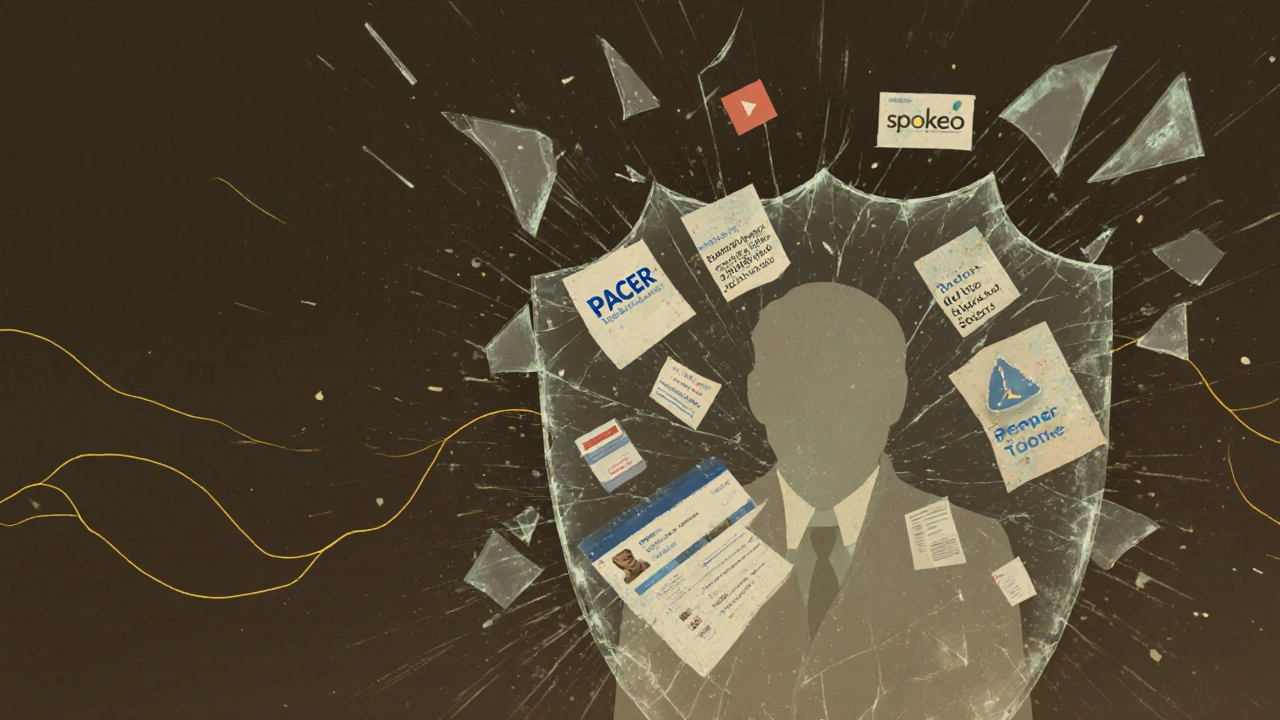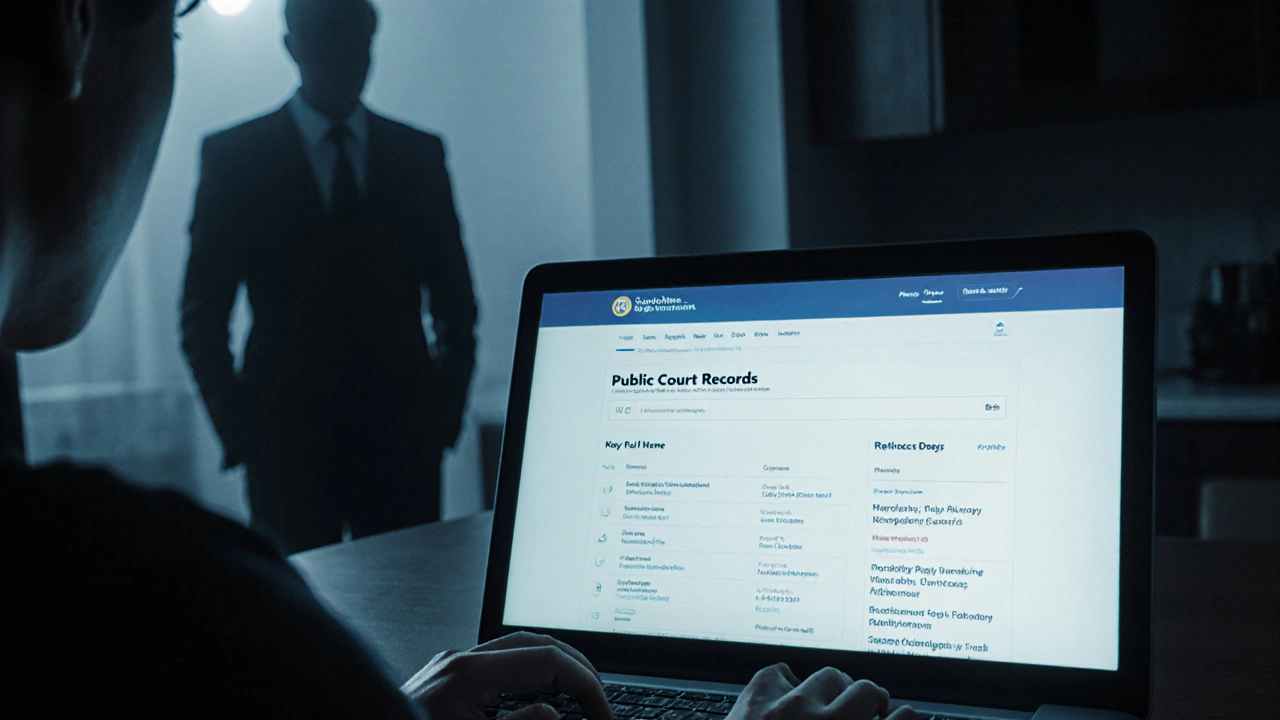When you’re involved in a legal case related to sex work, your name, address, and personal details can end up in public court records-easily searchable by anyone with an internet connection. This isn’t just inconvenient. For many, it’s life-threatening. Employers, family members, landlords, and even strangers can find your history with a quick search. And once it’s out there, removing it is nearly impossible.
Why Public Records Are a Dangerous Trap
In most jurisdictions, court filings are public by default. That means if you were arrested for solicitation, charged with operating an unlicensed business, or even just testified in a case involving sex work, your name could be listed in a database accessible through county clerk websites, PACER systems, or third-party background check services.These records don’t disappear after a case is dismissed. They don’t vanish if you were never convicted. They stick around. And they’re often pulled into commercial databases that sell your information to employers, landlords, and dating apps. A 2024 study by the Global Network of Sex Work Projects found that 68% of sex workers who had been through the legal system reported losing housing, jobs, or custody rights because their records were discovered.
This isn’t about guilt or innocence. It’s about survival. Sex workers aren’t asking for special treatment-they’re asking not to be punished twice: once by the law, and again by the permanent exposure of their personal lives.
What Information Is Typically Public?
You might think only your name and charge are visible. But in reality, court documents often include:- Your full legal name and any aliases used
- Home and work addresses
- Date of birth
- Phone numbers and email addresses
- Names of witnesses or clients (even if anonymized in court, they may appear in filings)
- Details about your income sources or financial transactions
- Medical records if health-related defenses were raised
Even if your case was sealed or expunged in theory, many systems still retain digital copies. And if a reporter, private investigator, or even a curious neighbor finds your name in a public database, they can piece together your identity from fragments.
How to Request Privacy Protection
The good news? You’re not powerless. In many places, you can ask the court to restrict access to your personal information. This is called a privacy protection order or redaction request.Here’s how to start:
- Ask your lawyer to file a motion for confidentiality under local rules. In some states, like California and New York, you can cite your safety as grounds for sealing records.
- Use a pseudonym in court documents if allowed. Some jurisdictions permit the use of initials or aliases for sex workers in non-criminal proceedings.
- Request that sensitive details-addresses, phone numbers, financial records-be redacted from all public filings.
- Ask the court to limit access to your file to court personnel only, not the general public.
Don’t assume your lawyer will do this automatically. Many legal professionals aren’t trained in the unique risks sex workers face. Be specific. Say: “I am requesting privacy protections under [state law] because public disclosure of my identity poses a serious threat to my physical safety and economic stability.”

What If You’re Already in the System?
If your name is already in public records, it’s harder-but not impossible-to fix.Start by searching your name on:
- Your county’s court website
- PACER (for federal cases in the U.S.)
- Background check sites like TruthFinder, BeenVerified, or Spokeo
Once you find your records, contact each site directly. Most have removal forms. You’ll need to prove you’re the person named and explain why the information should be removed-typically citing safety, harassment, or identity theft risk.
For court records, you may need to file a petition to seal or expunge. This varies by state. In some places, like Washington and Oregon, you can petition to seal records if your case was dismissed or resulted in diversion. In others, you’ll need to show “compelling interest”-like ongoing threats or loss of livelihood.
Organizations like the Sex Workers Outreach Project (SWOP) and the Global Network of Sex Work Projects offer free legal referrals to help with this process. Don’t go it alone.
What Doesn’t Work
Many people try to delete their records by paying third-party services that promise to “erase” their online history. These services often charge hundreds of dollars and deliver little. They can remove listings from a few background sites-but they can’t touch court archives.Also, don’t assume that paying fines or completing probation means your record is hidden. Legal closure doesn’t equal digital erasure. In fact, many systems log your case as “resolved,” making it easier to find because it’s marked as legitimate and official.

Protecting Yourself Beyond the Courtroom
Even if you get your court records sealed, you need to lock down your digital footprint:- Use a PO box or private mailbox service for all official correspondence.
- Never use your real name on payment platforms like PayPal or Venmo. Use a business name or alias if legally permitted.
- Keep your phone number and email separate from your legal identity. Use burner phones or encrypted services like Signal.
- Regularly check your name on search engines and request removals from data brokers.
- Consider legal name changes if your safety depends on it-but know this won’t erase past records tied to your old name.
Some sex workers in Canada and Australia have successfully petitioned for name changes under domestic violence protections. If you’re in danger, talk to a legal aid group that works with marginalized communities.
Legal Changes Are Coming-But Slowly
In 2023, New Zealand passed legislation requiring courts to automatically redact personal details in sex work-related cases unless there’s a clear public interest in disclosure. California’s SB 1027, enacted in 2024, allows sex workers to petition for sealing of arrest records without a conviction.These are small wins. But they show that change is possible when people demand it. If you’re in a position to speak up-whether through advocacy, testimony, or simply sharing your story with a trusted lawyer-your voice matters.
Privacy isn’t a luxury. It’s a necessity. For sex workers, protecting your identity isn’t about hiding-it’s about staying alive.
Can I get my name removed from public court records after a sex work case?
Yes, but it depends on your location and the outcome of your case. In some places, you can petition to seal or expunge records if your case was dismissed, diverted, or resulted in no conviction. You’ll need to file a formal request with the court and prove that public access poses a serious risk to your safety or livelihood. Legal aid groups specializing in sex worker rights can help with this process.
Do I need a lawyer to request privacy protection in court?
You don’t legally need one, but it’s strongly advised. Court procedures for sealing records are complex and vary by jurisdiction. A lawyer who understands sex work laws can draft the right motion, cite the correct statutes, and argue your case effectively. Many nonprofits offer free or low-cost legal help to sex workers-don’t hesitate to reach out.
What if I was never charged but my name still appears online?
Even if you weren’t charged, your name might appear in police reports, arrest logs, or media coverage. These aren’t always court records, so sealing them requires a different approach. Contact the agency that published the info (like the police department) and request removal under privacy or defamation grounds. For online listings, use removal tools from data brokers like Whitepages or Intelius. Document every request and keep copies.
Can I use a pseudonym in legal proceedings?
In some cases, yes. Courts in California, New York, and parts of Canada allow pseudonyms for sex workers in civil or non-criminal cases-especially when safety is at risk. You’ll need to file a motion explaining why using your real name endangers you. Criminal cases are harder, but even there, some judges allow initials or first names only if there’s no risk to the public interest.
Are there free resources to help me remove my information from public databases?
Yes. Organizations like the Sex Workers Outreach Project (SWOP), the Global Network of Sex Work Projects, and local legal aid clinics offer free guidance on removing personal data from background check sites and court records. They can also connect you with pro bono lawyers. Avoid paid services that promise to erase your history-they rarely deliver.
What to Do Next
If you’re currently involved in a legal case: talk to your lawyer today about privacy protections. Don’t wait until the case ends.If your records are already public: start by searching your name on your county’s court website and major background check services. Make a list of every place your info appears. Then contact each one with a formal removal request.
If you’re unsure where to start: reach out to a sex worker advocacy group. They’ve helped thousands navigate this exact problem. You’re not alone-and you don’t have to fight this alone.
